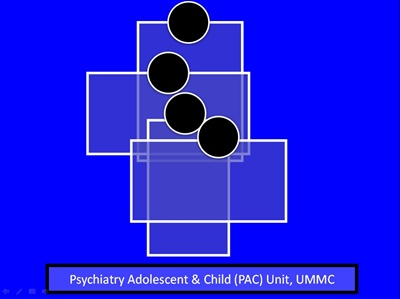Triage Counter
It is situated on the ground floor of the Primary Care Medicine building: Counter 1, 2, 3
Screening patients for:
- General Outpatient Clinic (Klinik Am)
- Specialist clinics
- Emergency unit
Registration Counter
It is situated on the ground floor of the Primary Care Medicine building - Counter 4 to10
- Registration for General Outpatient Clinic (Klinik Am)
- Payment collection for visitation and laboratory tests
- Appointment for follow-up
General Outpatient Clinic (Klinik Am)
It is situated on the ground floor of the Primary Care Medicine building, consisting of 15 consultation rooms and 2 treatment rooms. This clinic offers outpatient treatment for new patients, referral cases as well as follow-up (short-term).
Operating hours:
Monday to Friday
8.00 am - 9.00pm (new patients)
2.00pm - 5.00pm (follow-up)
(Closed on Saturday, Sunday and public holidays)
Consultation fee:
RM5.00
Services include consultation for acute and chronic medical problems.
Family Clinic (klinik keluarga)
It is situated at the first floor of the Primary Care Medicine building, consisting of 16 consultation rooms and 1 treatment room. The Family Clinic offers long term outpatient care for patients with chronic diseases and their family members.
Operating hours:
Monday to Friday (except Tuesday afternoon)
8.00 am - 1.00pm (walk-in cases)
2.00pm - 5.00pm (follow-up cases)
(Closed on Saturday, Sunday and public holidays)
Consultation fee:
RM5.00
Staff Health Clinic
It is situated at the first floor of the Primary Care Medicine building. Staff Health Clinic offers:
- Outpatient treatment for UMMC staff and their family members.
- Medical examination for new staff
Physician Clinic
It is situated in the Family Clinic - Consultation Room 16. Physician clinic is run by an assigned physician from the Department of Medicine for referral cases only.
Operating hours:
Monday to Friday (except Thursday)
8.00 am - 1.00pm
Consultation fee:
RM30.00 for first visit
RM15.00 for subsequent visit
KIDDS CLINIC (Child Health and Immunisation Clinic)
It is situated in the Family Clinic - Consultation Room 17. KIDDS clinic services include:
- Child health development assessment
- Immunization
- Health education for diabetic patients including insulin administration technique
- Mantoux Test
- DOTS for patients with tuberculosis
Operating hours:
Monday 2.00pm - 4.00pm
Wednesday 8.00am - 12.30pm
Thursday 8.00am - 12.30pm
Friday 2.00pm - 4.00pm
(Closed on Saturday, Sunday and public holidays)
Home Nursing
It is situated at the first floor of the Primary Care Medicine building. Home Nursing offers home visits to patients with these criteria:
- UMMC patient referred from the wards or clinics
- having difficulty to come to UMMC for treatment or follow-up
- stays within 10km radius from UMMC
- have a family member for supervision of patient
Services provided include:
- Health education to patient and family members
- Emotional support
- Basic nursing care
- Pressure sore prevention
- Blood taking and prescription of medication
- Blood pressure and blood glucose monitoring
- Wound dressing
- Naso-gastric tube/ Continuous bladder catheterization insertion
- Injection for psychiatric patient
- Physiotherapy
Home visit time:
Monday to Friday
9.00am to 1.00pm
Home visit fee:
RM10.00 per visit
Occupational Health Clinic
Occupational Health Clinic is a referral clinic for occupational diseases. It is located in the Family Clinic - Consultation Room 15
Operating hours:
Wednesday and Friday
9.00am to 12.00pm
It is situated at the first floor of the Primary Care Medicine building, consisting of 16 consultation rooms and 1 treatment room. The Family Clinic offers long term outpatient care for patients with chronic diseases and their family members.
View Clinicians CV : Click here
Visit Department of Primary Care Medicine website : Click here


